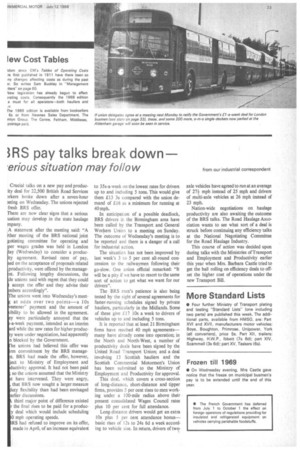3RS pay talks break down — .erious situation may follow from our industrial correspondent
Page 25

If you've noticed an error in this article please click here to report it so we can fix it.
Crucial talks on a new pay and producity deal for 22,500 British Road Services arkers broke down after a seven-hour xting on Wednesday. The unions rejected fresh BRS offer.
There are now clear signs that a serious uation may develop in the state haulage impany.
• ,A statement after the meeting said: "A her meeting of the BRS national joint otiating committee for operating and per wages grades was held in London ay (Wednesday) to consider a producIy agreement. Revised rates of pay, ed on the acceptance of proposals related productivity, were offered by the managent. Following lengthy discussions, the de unions said with regret that they could accept the offer and they advise their mbers accordingly".
he unions went into Wednesday's meetat odds over two points--a lOs eetener" payment and the amount of ibility to be allowed in the agreement. y were particularly annoyed that the .-a-week payment, intended as an interim rd while the new rates for higher produety were under negotiation, had apparently n blocked by the Government.
he unions had believed this offer was TM commitment by the BRS manage. 13RS had made the offer, however, eet to Ministry of Employment and uctivity approval. It had not been paid so the unions assumed that the Ministry t have intervened. They were angry, that BRS now sought a larger measure uty flexibility than had been envisaged arlier discussions.
third major point of difference existed r the final rises to be paid for a prcxluey deal which would include scheduling 0 mph operating speeds.
RS had refused to improve on its offer, made in April, of an increase equivalent to 35s-a-week on the lowest rates for drivers up to and including 5 tons. This would give them i13 3s compared with the union demand of i16 as a minimum for running at 40 mph.
In anticipat:.on of a possible deadlock, BRS drivers in the Birmingham area have been called by the Transport and General Workers Unio'i to a meeting on Sunday. The outcome of Wednesday's meeting is to be reported and there is a danger of a call for industrial action.
The situation has not been improved by last week's 3 to 5 per cent all-round concession to the railwaymen following their go-slow. One union official remarked: "It will be a pity if we have to resort to the same sort of action to get what we want for our drivers".
The BRS men's patience is also being tested by the sight of several agreements for faster-running schedules signed by private hauliers, particularly in the Midlands. Some of these give £17 lOs a week to drivers of vehicles up to and including 5 tons.
It is reported that at least 21 Birmingham firms have reached 40 mph agreements— many have already come into operation; in the North and North-West, a number of productivity deals have been signed by the United Road Transport Union; and a deal involving 13 Scottish hauliers and the Scottish Commercial Motormen's Union has been submitted to the Ministry of Employment and Productivity for approval.
This deal, which covers a cross-section of long-distance, short-distance and tipper firms, provides 5 per cent rises to men working under a 100-mile radius above their present consolidated Wages Council rates plus 10 per cent for full attendance.
Long-distance drivers would get an extra lOs plus 5 per cent attendance bonus-basic rises of 12s to 24s 6d a week according to vehicle size. In return, drivers of two
axle vehicles have agreed to run at an average of 27+ mph instead of 25 mph and drivers of multi-axle vehicles at 26 mph instead of 23 mph.
Nation-wide negotiations on haulage productivity are also awaiting the outcome of the BRS talks. The Road Haulage Association wants to see what sort of a deal is struck before continuing any efficiency talks at the National Negotiating Committee for the Road Haulage Industry.
This course of action was decided upon during talks with the Ministries of Transport and Employment and Productivity earlier this year when Mrs. Barbara Castle tried to get the ball rolling on efficiency deals to offset the higher cost of operations under the new Transport Bill.












































































































